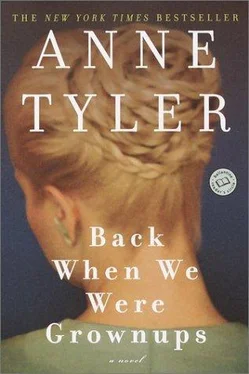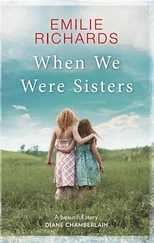“ My last birthday party was in 1927,” Rebecca’s mother said. “I was five years old.”
Aunt Ida said, “Oh, that can’t be right! What about when you turned eighteen and Mother gave you her pearls?”
“That wasn’t a party, though, Ida.”
“Well, you had a cake! With candles on it! If you don’t call that a party, I’d like to know what it was!”
“Have a seat,” Rebecca told them. “Who would like iced tea?”
“Oh, I would, darlin’, if it’s made,” Aunt Ida said.
It was. (Rebecca knew that they always drank iced tea with lunch, even in the dead of winter, although at suppertime they would turn it down for fear of not sleeping well.) She brought the pitcher from the refrigerator and set it on the table. Aunt Ida was forking a mountain of cold cuts onto her plate, selecting each slice daintily with her little finger quirked as if that would make her portion seem smaller. Rebecca’s mother was delivering a blow-by-blow account of their trip. “We took the old County Highway,” she said, “because you couldn’t pay me to drive on that I-95, all those truckers whizzing past blaring their horns at a person. I don’t think I told you about Abbie Field’s daughter having that awful accident on I-95 down near Richmond. She had gone to I think Heathsville, or Heathsburg, one of those places; was it Heathsville? Heathsburg? Went to visit her parents-in-law and was coming back on a Sunday after mass; her mother-in-law is Catholic, you know, one of those very devout Catholic widows, and she had invited Abbie to her ladies’ bridge club luncheon on Saturday and then—”
“Wait; that’s not possible,” Aunt Ida said.
“Beg pardon? Of course it’s possible. You can be a Catholic and still play bridge.”
“You said Abbie went to visit her parents-in-law. Plural. But that her mother-in-law was a widow.”
“All right; I misspoke. It’s not a capital crime.”
Rebecca said, “How’s the move coming, Mother?”
“What move?”
“Your move to the retirement home.”
“Oh, that. Well, I’m working on it, but first I have to sort my belongings.”
Aunt Ida sent Rebecca a look. “Have a deviled egg,” Rebecca told her.
“Why, thank you, hon. I really shouldn’t, on account of my cholesterol, but you know I can’t resist.”
“Folks tell me I should hire help,” Rebecca’s mother said. “I’m too old to do all that sorting on my own, they tell me. But you know how that works. When Ida here tried to clean out my desk, would you believe what she did? Threw away a perfectly good sheet of three-cent postage stamps.”
“Have a deviled egg, Mother,” Rebecca said.
Then the phone rang, and she cried, “Whoops!” and raced off to answer it, even though the kitchen extension was no more than a foot away from her.
* * *
Rebecca’s Bedouin costume was a long black woolen robe with broad vertical bands of purple, red, and turquoise running from shoulder to hem. It made her feel like Elizabeth Taylor in Cleopatra, she had told the clerk at Discount Dashikis when she was trying it on. In order to keep the bright colors from blanching her features, she applied a good deal more makeup than usual. Then she wound a splashy purple-and-black silk sash around her head. When she descended the stairs, the sash wafted out behind her like a bridal train. “Goodness,” her mother said, meeting up with her in the foyer. Rebecca gave her a sphinxlike smile. (Nothing she would wear could make her mother happy.) But Aunt Ida, already seated in the front parlor, cried out, “Oh, my, don’t you look cheery!”
“Thank you,” Rebecca told her. In a majestically level, swift, flowing motion, she crossed to the hearth and bent for the butane torch hidden in the basket of pinecones at one side. She started lighting the candles she had set around the room — the Christmas candles and the Hanukkah candles and the all-occasion candles and even the pale egg-shaped candles ordinarily reserved for Easter.
“It’s a regular conflagration!” Aunt Ida said gaily.
Rebecca’s mother sat down in the rocker, first smoothing the back of her slacks beneath her as if she were wearing a skirt. “I laid out your cocktail napkins in a fan shape,” she told Rebecca. “I don’t know if that’s the way you wanted them. I straightened up some in the kitchen, and I took the liberty of watering that poor dead plant out back beside the steps.”
“Thank you, Mother.”
“You’ll find the leftover cold cuts on the top shelf in the fridge. I put them in one of those newspaper bags I found in the waxed-paper drawer, although I’m not entirely easy in my mind about letting foodstuffs come into contact with colored plastic.”
“I’m sure they’ll be finished off before the poison has time to take effect,” Rebecca told her.
The doorbell rang. Her mother said, “Mercy,” and checked her watch. “It’s three minutes before two! Who do you suppose that is?”
“Not a Davitch, you can bet,” Rebecca said. She went out into the foyer. “Company, Poppy!” she called up the stairs, and then she opened the door. J. J. Barrow, her electrician, was standing on the stoop with his twelve-year-old son. Both of them were dressed up — J.J. in a suit and tie, his son in a navy blazer and tan corduroys — and J.J. was holding a bottle of bourbon with a ribbon around its neck. “Come in!” Rebecca told them. “You two are so punctual!”
“Well, we didn’t want to keep folks waiting,” J.J. said. He was a large, bearded bear of a man, a type Rebecca had a weakness for, and she had invited him on impulse when he and his son came to fix the thermostat earlier in the week. Now she ushered them into the parlor, keeping an arm around the son’s shoulders. “Mother,” she said, “Aunt Ida, this is our electrician, J. J. Barrow, and this is his son, J.J.J.” J.J.J. was what they called J.J. Junior, and she always had to stifle a giggle when she was saying it; it made her feel she was stuttering. “My mother, Mildred Holmes, and my aunt, Ida Gates.”
“How do you do,” Aunt Ida said, and Rebecca’s mother smiled and tilted her head. “Are you… here as guests?” she asked.
“Yes, ma’am,” J.J. said. “My wife would have come too, except her pastor dropped by unannounced.”
“J.J. can handle anything electrical,” Rebecca said, “and also some plumbing repairs as long as they don’t require inspection. And his son knows nearly as much as he does; don’t you, J.J.J.?” Oops, another giggle.
J.J.J. looked worried and said, “Well, I would still need Pop’s help with some of the big things, though.”
“Rebecca and me have been through a lot,” J.J. said, falling into a chair. “She was my main support when my first wife up and left me. And I was around when her grandson Danny passed through that little shoplifting stage.”
“Well, now!” Rebecca said, clapping her hands. (She hadn’t mentioned Danny’s shoplifting stage to her mother.) “Where’s our guest of honor, I wonder!”
Her mother wore a blank expression. Aunt Ida just smiled and patted the sofa cushion beside her. “Why don’t you come sit down, J.J.J.?” she asked. “Aren’t you sweet, to attend an old man’s birthday party!”
“I never met anybody who was a hundred before,” he told her, and he crossed the room and settled next to her, admirably composed, hands folded loosely between his corduroy knees.
Now they heard Poppy on the stairs — cane, shoe, shoe; cane, shoe, shoe — and Rebecca went out to the foyer to meet him. He often woke from his nap extra stiff; she thought he might want help. But no, he was barely leaning on the banister, and his face looked rested and relaxed, not stretched by pain. He wore his gray suit and a narrow black bow tie knotted around a collar so high and starched that he seemed to have stepped directly from the year when he had been born. His hair was slicked down flat and his cheeks looked polished. “I thought I heard the doorbell,” he said.
Читать дальше












